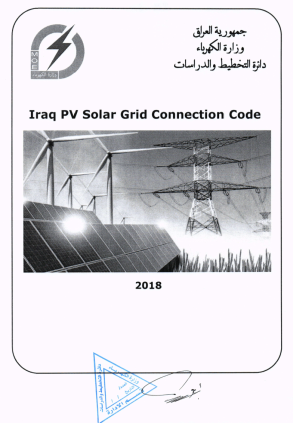DECODING THE IRAQI "PV CODE"

DECODING THE IRAQI "PV CODE"
"Grid Code" is an important document established by nations to secure resilient power system.
During my search for the Iraqi "Grid Code" which was part of many tenders issued by Ministry of Electricity (MOE)-Iraq. By coincident I put my hands on a document titled "Iraq PV Solar Grid Connection Code".
As a first glance I were very happy that MOE addressed such important topics related to renewable energy sources.
From my knowledge of the well known "German code" issued 2007, the code took many years to be established and normally involving all parties involved in a national system TSO, DSO, standardization authority, etc.
The "PV code" came with 28 pages all signed by "deputy Manager" of the planning and studies office in the MOE presented himself as PhD degree holder, the document is co-signed by six seniors as their titles shows.
Iraqi "PV code" disclose clearly the situation in the MOE and may give clear idea how other ministries are working those days.
The “PV code“ was attached to one BOO tender document which should have been reviewed by a specialist before issuing to the public especially this tender was issued as investment projects in different governorates.
|
Suggested site |
Governorate |
Available power (MW) |
Voltage level (kV) |
|
Jissan
|
Wassit |
50 |
33 |
|
Iskandariya |
Babil |
225 |
132 |
|
Karbalaa |
Karbalaa |
300 |
132 |
|
Khidhir |
Muthanna |
50 |
132 |
|
Ramla |
Aldewanya |
50 |
132 |
|
Sawa-1 |
Muthanna |
30 |
33 |
|
Sawa-2 |
Muthanna |
50 |
132 |
The purpose of the “PV Code” as described in the document is “to determine the technical requirements for interconnecting PV power plants with the Iraqi power system to ensure the safe operation f Iraqi power system”
That looks fine but let us discuss the content of the “PV Code” and check the value of such document.
1. The Iraqi “PV Code” is mostly a copy-paste version of the
“Solar Energy Plants Grid Connection Code “ , Code March 2017, with 28 pages which surprisingly the same number of pages as copied by the PhD’s holder team.
2. Despite the fact that I am not very impressed by the Egyptian connection code which lakes a lot of details , there is a clear differentiation in the code between Large Size Solar Power LSSP which has a capacity larger than 20MW and the medium size one MSSP with a range of capacities 500kW to less than 20MW.
This differentiation give the system planner the opportunity to choose the proper PQ characteristics required.
In the Iraqi “PV Code” they modified these requirements according to the connection point, so it is DPV when it is connected to distribution network 33/11kV and TPV when it is connected on the 132 kV or higher.
3. The Egyptian connection code referred to a number of International codes and standards which are relevant but neglected by Iraqi “PV code” team for unclear reason except to keep the number of pages to 28.
4. Many more sophisticated “PV codes” are openly available on the web, the team should have look at those like the Lebanese Grid study prepared by UN , European codes between others.
The Iraqi “PV Code” team choose to copy paste the poorly written Egyptian connection code and destroy it completely, one example is the figure below :

The Original figure is intended to describe the PQ characteristics requirements of different sizes of PV plants to cope with the code and national grid operational requirements.

5. Fault ride through capability section in the Iraqi “PV code” addresses the dynamic behavior of the PV power station during system strains, this is a text book example and shall not be in any how considered in such document since the required profile should be according to the power system studies and agreed upon with the designer of the control system of the PV power plant.
Conclusion
Iraqi PV code needs to be reviewed carefully to avoid the harmful effect on the national grid and on the future operation of the power system.
The review teams shall consist of specialists with vast knowledge of the power system with a special experience in the Iraqi grid.
MOE shall call back this code and never attach it to the announced tender until approved by authorities.
This code will never be helpful to build resilient power system.
Tareq Aljumylee
Electrical Engineer
IEEE Member
IET Member